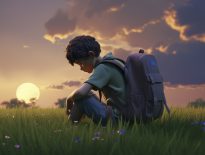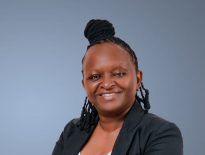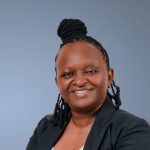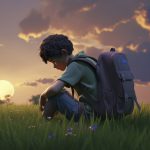Old dogs can learn new tricks. After graduating in December 2019, I landed a job in one of the posh primary schools in Kenya. It was posh as all the students had a master of the queen’s language; unlike the village I originate from, where we all glorify our mother tongue. Many of us learn the queen’s language when we are in senior classes and the majority of us are never too comfortable to utter the same in public, even in adulthood. The school was expensive, and a painful joke would run around that one student’s school fees would pay five members of staff. Despite the reimbursement part, I enjoyed my job, and interacting with the young ones cheered my heart. They would challenge us to be better adults.
However, on March 13, 2020, the first COVID-19 case was announced in the country. Learning institutions were affected first. So many people, including me, lost their jobs. The school adopted online learning immediately, even before many in the corporate world would actualise working from home. Since my job description involved being physically present, I was among the first culprits to be laid off. I was devastated. I was unsure of the next move. I felt unlucky. But at least I was not alone.
My housemate, Mutava who later became my spouse, was then training to be an advocate, and was on pupillage in one of the law firms in the city. People in the legal field took long before adopting remote working. Many were either laid off or maintained with little to no pay. It was an unpredictable time such that we would just be happy to see the next day.
We depended on the little, less than 40 dollars that his employer was sending to him. Our country, just like many others, was on lockdown, and we were quarantined to contain the virus. We could not move from the city to our rural areas. We depended on those who had managed to move, before the government barred movement, for agricultural produce like maize, potatoes, onions, and any other available food that they would send on courier vehicles.
Many marriages and families were greatly affected mentally, financially, and socially by the unpredicted period. Businesses were lost and worse of all, lives were lost. It was during this time that our neighbour lost all his belongings to a shylock company. His wife and children left and we never heard from them. On the positive, all the neighbours chipped in whatever little they had for him to be on his feet again. We therefore had to look for something to keep us busy lest we fell into depression.
Fortunately, my housemate, Mutava, had a bicycle he had acquired for commuting to the Law School for the Advocates Training Programme, 40 kilometres away—a distance he covered every day. The school had a changing room for those who used the swimming pool so he would freshen up after the long ride and join the rest for the three-hour class session before cycling back for another 40-kilometer.
Read – My Fractured Identity – A Creative Non-Fiction by Angel J Okonkwo – Nigeria
I had never tried cycling. I had always imagined that I would probably fall and end up hurting my back or breaking my leg or hand. I was so scared that he had to convince me for days before I agreed to push the bicycle, let alone be on top. He trained me, for days, which turned into weeks. Once I mastered the art of balancing on the two wheels, we pulled resources and bought a second bicycle. It was locally used and unmaintained but we could manage with it.
Cycling became not only a hobby but also our means of transport. We were scared of boarding public vehicles, as the virus was spreading fast, and having an asthma history, we never wanted to take any chance of getting the respiratory virus. Either way, we did not have the luxury of money. The sport was also the only major way we would keep our mental health in check.
We also tried sack farming, not only to supplement our budget but to keep us engaged as well. Our spinach and kale did so well that we would supply our neighbours. We would fill any little space we would see, including containers with kales just to be able to survive. It was a learning experience as well. We played with the neighbour’s children at the apartment we lived in. Fortunately, we were just a few, so containing the virus was not hard, or so we thought. Skipping the rope, playing hide and seek, and playing football among other games kept all of our mental and physical health in check. We would ensure that each member of the apartment had something to eat at the end of the day. All this we did while ensuring that we did not catch the virus as we observed all the safety measures the World Health Organisation, together with Kenya’s Ministry of Health, had set.
Initially, we began by taking short rides; as the days progressed and we saw no signs of coronavirus ever leaving our world, we trained more and took even longer rides. We made memories, took photos, visited new places, and even joined other cyclists nearby for rides. We saw positivity in a world that was bleeding, losing its sons and daughters to the worst disease that ever affected our generation.
Many parts of Kenya do not have designated cycling lanes and those available are not exclusively left for cyclists. So, one day, we decided to run errands in Nairobi Central Business District, Kenya’s capital city with our two bicycles. We struggled with motorists for more than 18 kilometres. At a busy bus stop with several people struggling to catch the many buses heading to different routes, Mutava thought he had lost me as he was the lead cyclist. Our bicycles did not have side mirrors.
He slowed and looked back to check if I was still in line. Fortunately, or unfortunately, I was following him bumper to bumper with the same pace he had initially set. So, when he looked back, I miscalculated my moves and as the learner I was, I bumped into him on the busy famous Waiyaki way. We both fell on the hot tarmac, inspired by the hot scorching sun of the day and hurt ourselves and the bicycles. We were in so much pain that despite being on the highway, we were not able to stand and seek safety out of the highway as fast as expected. Had the lady motorist behind us not slowed down, we would not have lived to tell this tale. Unexpected, we picked ourselves up, rested a bit, and proceeded with our hurt knees to the CBD. We also went through church to thank God for saving us from the accident. Churches were deserted and very few people were present then. Just the men and women of the cloth.
We were so broke that we had no money to pay for a passenger vehicle to ferry us back to our residential place despite being tired and hurt. We cycled back uphill, with our empty stomachs growling, on a journey that took ages.
——-
 Brianna is an avid creative holding a Bachelor of Arts in Communication and Sociology from the University of Nairobi. She is a keen observer of her environment and sees a story in each happening. Brianna has worked as a communication officer in different organisations. Amongst her roles was creating content in terms of stories for the institution’s monthly magazines. She also entertains her followers on social media accounts with awesome stories with the aim of promoting mental health. Brianna is a part-time writer, business lady, wife and mum of a 3-year-old girl and 4-month-old twin boys. In her free time, she loves cycling, skating and travelling to new places. She desires to be a successful and entertaining creative to put a smile on the consumers of her content.
Brianna is an avid creative holding a Bachelor of Arts in Communication and Sociology from the University of Nairobi. She is a keen observer of her environment and sees a story in each happening. Brianna has worked as a communication officer in different organisations. Amongst her roles was creating content in terms of stories for the institution’s monthly magazines. She also entertains her followers on social media accounts with awesome stories with the aim of promoting mental health. Brianna is a part-time writer, business lady, wife and mum of a 3-year-old girl and 4-month-old twin boys. In her free time, she loves cycling, skating and travelling to new places. She desires to be a successful and entertaining creative to put a smile on the consumers of her content.







